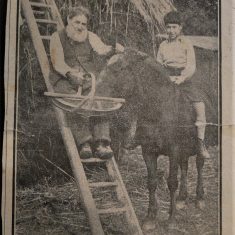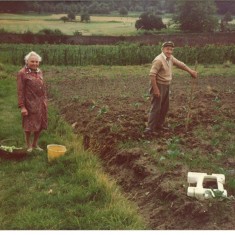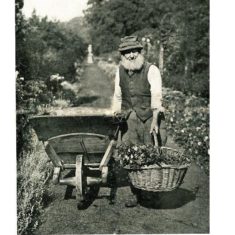Charlie Beavin
Head Gardener at Knole from 1938
Interviewed by Robert Sackville-West
Charlie's father William and the Beavin family
“My father he was here, his sister she used to run the farm during the First World War, the first part of the war. She had got training for milking and things like that, and she used to look after the cows, and do the butter making and everything on the farm. Her brothers worked here for a time. My nephew he was here 15 year I think all in, except for a couple of years, the last year when he was ill. Most of the family’s been on the estate.”
Interviewer: What was your father called?
“He was here doing the stable work.”
Interviewer: And his name was …
“William. Yes, he used to do all that, go to London – all the journeys, for everything on the estate.”
William's regular trips to London by horse and cart
Interviewer: When he was delivering things to London, I suppose that was in the days before cars? He went up in a horse and cart?
“Yes, He used to take – for their large dinner parties and that in London. Well, sometimes he had to take a hamper of silver from here up to there. We used to send vegetables up. Well then they’d put the silver at the bottom of the van sort of thing. And we used to have to take a lot of logs and all, you see.”
Interviewer: This was on horseback?
“Yes, horse and van. One horse he used to have, we had him for years – I think that knew more about going up to London and back than my father did really. Because he used to go up there once a week, stop there the night. And then perhaps he had different jobs to do if Lady Sackville was there when he got up there, going here there and anywhere. Sometimes he didn’t come back till one o’clock in the morning.
Interviewer: How long did the journey take?
“It used to take several hours. He used to get to up near the Rock and Fountain [pub] I believe where he used to stable the horse for the night. And then carry on up to the London house.”
Wartime growing of vegetables; wages and working hours
Interviewer: What did you do in the second war?
“Well I was here and then they got me exempt for growing vegetables you see. I had to sell so many vegetables to help out. That’s the way we worked it out. It was a problem at times, but still we got through it.”
Interviewer: How many people were there, working on the estate when you arrived, altogether?
“Ah well, there were quite a few old ones, you know all round; there were two or three gangs of woodcutters and all that, because a lot of that was piece work, very hard work. I think the wages, the ordinary weekly wage for anyone was about 18 shillings a week.”
Interviewer: What was your first wage?
“About 6 shillings a week, 12-hour day. We used to leave off at 5 o’clock Saturdays because that was a short day, instead of leaving off at 6.”
Cut flowers for all the rooms; vegetables every day
“During the years, you see, I took on – once I started on greenhouse work, one of my jobs was to see to the decoration, because the Head Gardener he told me how to go on; and you had to decorate from the sitting room right down to the library – in all the rooms. You had pot plants, cut flowers, and you had the large glass tubes in the Colonnade – flowers all in those and everything. But it used to look very nice when it was done. And in the dining room where the radiators are, where the window is, that used to be full up with plants there. And the heat there used to be kept up, nothing under 60 degrees [Fahrenheit] in the dining room.”
Interviewer: And you had to arrange all the flowers, did you?
“Yes, yes, I arranged them all, yes. And there was all the fruit, and grapes and peaches, nectarines. And of course, the thing – Lord Charles, he was a tip-top fruit man – and everything had got to be just so in the fruit line. And vegetables, he used to have nothing under two vegetables for lunch and dinner, every day.”










Comments about this page
I am looking for any information abut a James Lane and a Florence Croucher. James worked in the garden and possibly with the horses and Florence as a maid. What are the names of the gentlemen in the photo above with the horse?
Dear Diana,
Thank you very much for your comment and question. Would you be able to give us the year and place of birth of both James Lane and Florence Croucher so that we can try and answer your question? From the turn of the 20th century, details about Knole Estate staff continue to reside with the Sackville family estate papers and not at the Kent and History Library Centre.
Many thanks and best wishes,
Veronica Walker-Smith
Knole Oral History team volunteer
Add a comment about this page